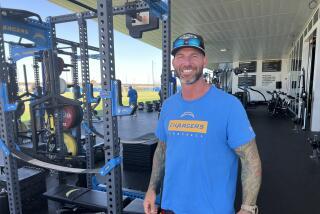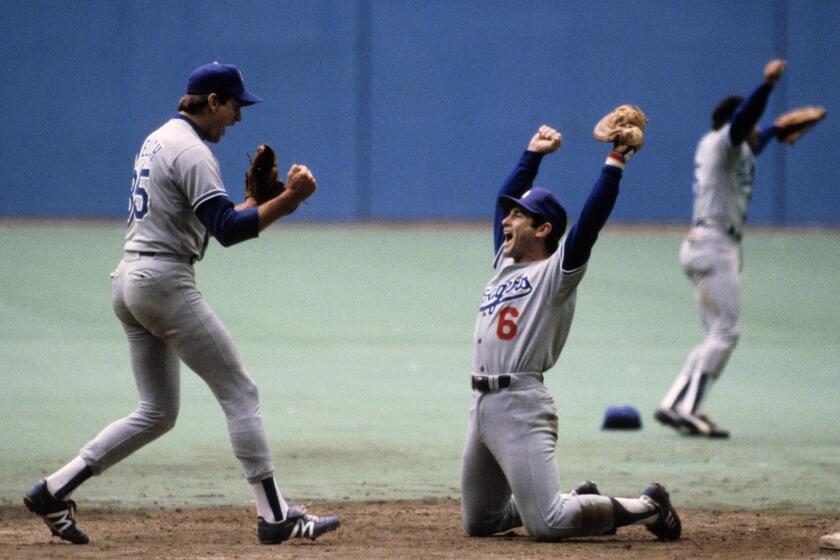The Alumni of College of Hard Knocks
They played in leather helmets or none at all. The shoes were high-cut and had wooden cleats the size of thimbles. The pants were made of moleskin, and the shirts had patches on the elbows.
Only sissies wore pads. No one had ever heard of face masks. If you hadn’t lost any teeth, the coaches knew you were no good.
They played for $50 a game. There was no trainer, no doctor. You tended your own wounds. There was no hot water, but that didn’t matter because there were no towels, anyway. They came to the ballpark suited up in uniforms they had to launder themselves.
If they wanted their games in the paper, they took the story down to the sports department. It was usually a good idea to take a bottle of whiskey, too.
They played for the Stapleton Pros, Dayton Triangles, Providence Steamrollers, Canton Bulldogs, Frankford Yellowjackets or Hartford Blues. They played wherever the bus broke down, these pro football pioneers.
If it was your team, you got your line out of the roundhouse, your backfield out of a pool hall and your coaches out of the Marine Corps.
There was no draft. No self-respecting college would let your representative on campus. Your game appealed only to a small, hard core of aficionados. Nice people didn’t go.
If you were a player, you played both ways. There was no such entity as a special team. You played on punt returns, kickoff returns, defense, offense and everything in between. There were 16 men on a squad.
You were pioneers. You helped build a sport. You helped capture the public imagination. When you came along, only Yale-Harvard, Army-Navy, Notre Dame-Army sold out the big ballparks in the big cities.
You were Alex Wojciechowicz and Ken Strong and Greasy Neale and Jim Thorpe and Turk Edwards and Tuffy Leemans and Dutch Clark and Ace Gutowsky, and you clawed your way to history by word of mouth. Howard Cosell, NBC and CBS weren’t there to help. There was no “Countdown to Kickoff.”
You took the forward pass out of the rule book and put it in the game. You took a set-piece, by-the-numbers gavotte and turned it into hard rock. You turned it into a tribal rite where a whole nation would come to a stop one Sunday in January to watch, the biggest one-day extravaganza since the Christians and the lions. You made a pass-the-hat business a billion-dollar package.
And what do you get out of it? A pat on the back, an introduction at a back table at a banquet, a few faded clippings in a hometown newspaper. But you’re still playing for fun, not money.
You might even be in the Hall of Fame. Unfortunately, you can’t sleep there. For some, that’s too bad. It might be warmer--and cheaper--than where they are living. There might be someone there to do something about the arthritis in their knees or the recurring headaches.
You made the game what it is today. You may have memories to go with the limp. But what you don’t have is a pension.
You see, if you played the game before 1959, you’re a non-person. Not for you any Super Bowl, Pro Bowl or intraleague revenues. You’re still playing out in the cold. You don’t get to be seen driving in one of those automobile ads. You don’t get in those comical beer commercials.
You don’t even get a gold pass to all the games. Even the railroads used to issue them to their old-timers. Football makes Commodore Vanderbilt look like Tiny Tim.
I had lunch with Dick Daugherty the other day. Dick is an old Ram, a pre-1959er who is on the executive committee of an organization called the National Football League Alumni Assn. It was founded some years ago by Wojciechowicz, the old Fordham and NFL center, when he came upon an old teammate, broke, dying and about to be evicted from a place where you wouldn’t want to live in the first place.
There were some 900 old-time players at that time--623 are still alive. They were not all destitute. Some were captains of industry themselves, successful real estate developers, company presidents.
But some of them weren’t. The great old coach, Buddy Parker, was dying, broke, in Texas. An ex-quarterback with a daughter who had a catastrophic disease couldn’t pay the hospital bills.
It wasn’t as if these guys had squandered their money. They didn’t have any to squander. When they played the game, you had to have a real job on the side.
At first, Wojie’s organization was greeted with hostility. It was considered a threat by both players and the league itself. It didn’t help when it began filing lawsuits.
But today, Daugherty reports, the organization is beginning to find itself. Only this week, it had one of approximately 30 golf tournaments it sponsors each year. It has 8,000 members, although not all of them are former football players. Bob Hope and President Reagan are members. The organization raises money not only for old football players but also for young kids and medical research.
Bronko Nagurski, Alex Wojciechowicz and the others found out that the public hadn’t forgotten them, even if the game had.
Guys who kept the flickering flame of the sport alive in the days when it was considered the illegitimate offspring of the college game no longer have to wonder how to keep themselves alive. As usual, they had to do it themselves. As usual, they could. As usual, they did.
More to Read
Go beyond the scoreboard
Get the latest on L.A.'s teams in the daily Sports Report newsletter.
You may occasionally receive promotional content from the Los Angeles Times.










